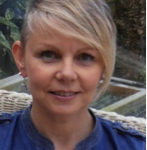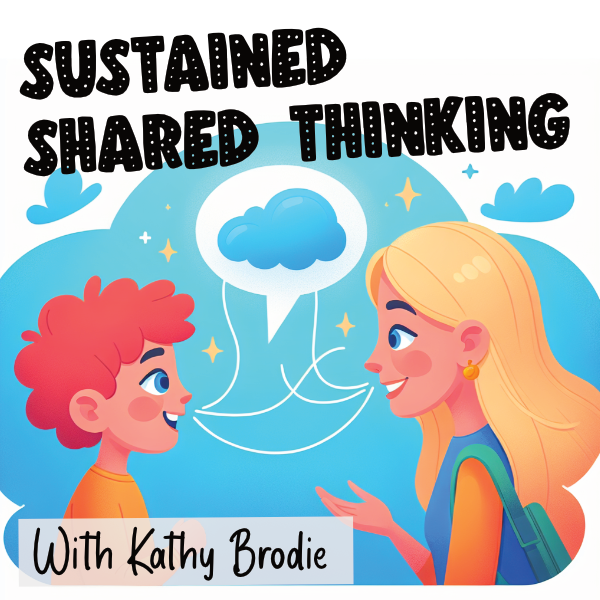Guest post
Sustained Shared Thinking: Children and Trauma

Today’s guest blogger, Jane Evans, has specialist knowledge in a much under represented area of early years – trauma and domestic violence. She is the creator of the ‘Tuning In’ Parenting Beyond Trauma, Parenting Towards Harmony and Happiness Programmes, and the ‘Tuning In’ Beyond Trauma Training for professionals.
Statistics from the womensaid organisation are shocking:
At least 750,000 children a year witness domestic violence. (Department of Health, 2002).
In 75% to 90% of incidents of domestic violence, children are in the same or the next room.
This is a subject which desperately needs discussion.
I’m very excited that Jane has written this blog post to promote such discussion about the subject. Do add your comments!
Tend and nurture a child’s emotions and they will grow to reach for the sky.
by Jane Evans, Specialist Parenting & Behaviour Skills Consultancy
Reading Kathy’s article on Sustained shared thinking gave me an ‘aha’ moment.
It prompted me to think about all the children, and parents, I have worked with, over a 15-year period, who have lived through trauma. Those people who so badly needed someone who could spend the time to help them to find the tools to expand on their thinking.
All children clearly would benefit from this, but the children I have known have experienced a variety of traumas in their short lives. Most of their experiences were of living with domestic violence and abuse, along with other forms of abuse and neglect.
As a Parenting Worker in a range of settings with families with complex needs, I often began my work with the main carer, usually a mother. I then did some 1:1 work with a child or children and used this to inform my work with the main carer.
I observed first hand the effects of trauma on the child’s development and the complex pattern of attachment between the main carer and the child, and the ways in which this impacted on the child’s social and emotional understanding and skills – and this is where practitioners need to focus their skills.
Taking part in ‘sustained shared thinking’ with traumatised children needs an extension of most practitioners’ skills. Knowledge and understanding of the effects of trauma on:
• brain development and function
• impact on behaviour
• speech and language
• social and emotional skills
would need to be the foundation for this.
Why? Children who live with, or through, trauma rarely develop the ability to access and connect with their feelings. There is often very little input from their carers who are preoccupied by their own stress and trauma and may not be able to offer this.
Therefore, it is crucial to take time to start this journey with young children by gently suggesting feelings they may have or thoughts so as to put ‘pennies’ in the empty slot machine.
Then, when they are asked, as they will be in life, how they feel about something they can ‘pay out’ with a response that they feel and understand. This in time will also give them the ability to empathise and understand that others have a mind and a set of feelings too.
Practitioners can gently suggest without jumping in too soon, “I saw what happened with you and Alfie, I wondered how you were feeling about it?
(Pause for child to respond), I was thinking that maybe you felt anxious, sad, confused etc.?”
Pennies are put in so they can later be ‘paid out’. Thinking can be expanded and built on once the child begins to feel that it is safe for them to look inwards as well as outwards. The practitioner is there to support them in doing this.
Traumatised children will often present as ‘falsely fierce’, fearless and overly confident.
Life experience has taught them this is how to survive and it needs an attentive, focused practitioner to pick up the subtle signals they throw out that all is not as it seems. These children do not have the ability to think things through, but are often only able to react on impulses to survive, as that is what has got them this far in their difficult lives.
‘Sustained shared thinking’ seems to be the first step in offering a much needed ‘attachment figure’ to children who have lived through trauma and the importance of this is inestimable!
More insight into, and understanding of, how parenting is affected by trauma, such as domestic violence, can be found during my training in Bristol in September.
Click here for my Tuning In Beyond Trauma Training
click here for information about Colette Winters training
About Jane Evans:
I have extensive experience of direct work with parents, carers, children and professionals who have been faced with the effects of trauma, such as domestic violence and abuse, child safeguarding issues, substance dependency, homelessness, mental illness, learning difficulties, school non-attendance and loss.
The families and professionals taught me that a different approach to supporting parents and carers was needed and that it had to be about emotional intelligence and empathy so this has been the corner stone for the parenting programmes, professional’s training, 1:1 parenting and consultancy work which I now offer.
Email: janeevans61@hotamail.co.uk
Phone: 07946318404
Twitter:JaneEvans @janeparenting
http://parentingposttrauma.co.uk/
To read my ultimate guide to Sustained Shared thinking, click here:
Kathy Brodie
https://www.kathybrodie.com/author/kathy-brodie/Kathy Brodie is an author, Early Years Professional and Trainer specialising in online training and courses. She is the founder and host of the Early Years Summit and Early Years TV, weekly Professional Development for Early Years practitioners and educators.

